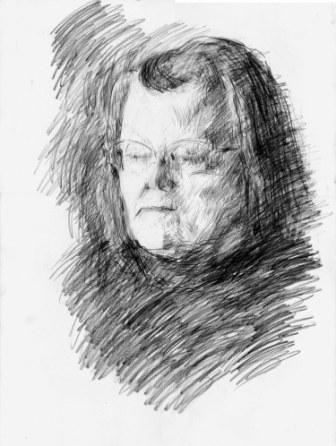When I read the section of my memoir “Sanctuary” to my writer friends, they began the discussion by saying things like “I could never be as good as you are.” I of course hadn’t been bragging about what a saint I was. I had after all been writing to myself, and I know to my sorrow how unsaint-like I am. My empathy for homeless people had been instilled in me by my mother and father. Although the Presence, whether inner or outer, has helped me to make the most of my three score years and ten, I don’t know if it has helped me to cure my faults. I know what the faults are, but just as I know I should exercise and eat right but don’t, I am not able to tame them. Perhaps without the Presence, I would be even worse. I am bossy, but in my marriage I was able to put that aside, partly because Bill was a strong character, and partly because I came to realize how good his judgment was. He and I made decisions together, we shared responsibilities, and we regarded our money as joint family income. I talk too much, and try to be conscious of that in any gathering. When I am weakened, as when my mother died or Bill began to have his strokes, I do go on about my troubles. When my mother died, I would say to Bill every time we went out to visit, “Don’t let me talk about my mother.” And then I would hear myself going on about her. Sometimes when I am talking too much, the realization of it flashes into my mind. Is that the work of the Presence? I love to gossip. Part of this, I know, is that I do love people and their interactions. But one terrible fault is saying something bad about others. I try to hold my tongue and feel awful remorse when I don’t. I do know I am more eager to tell good things about someone; I trumpet the triumphs of my family, friends and acquaintances. Although I was faithful in looking after Bill, I did let my anger spoil my faithfulness. I couldn’t hold my tongue when he had his irrational rages. I would pray earnestly to whatever is out there to let it pass, but more often than not, whatever was out there would not intervene. I am quick to forgive, in fact I don’t hold grudges long, don’t remember slights, but I am critical of others and not inclined to overlook their faults. I do realize that when I myself am in a good mood, I do overlook others’ faults more easily. Regrets: that I didn’t make more of Bill’s successes to him when he was alive; didn’t read his poetry to him, didn’t make more of his art work, didn’t remind him often enough of how successful he had been as a human being. Regrets: that I meddled too much in my children’s lives; that I wasn’t more understanding of Mrs. Bauer when she was going through her troubles; that unlike my college roommate, I haven’t been as faithful a friend as I should have been. These are moral failures, and that the Presence doesn’t intervene suggests to me that it isn’t concerned with them.
Saturday, December 29, 2012
Monday, December 10, 2012
In the spring of 1971 Bill’s colleague went looking for two lake-shore properties, one for him, one for his parents. He scouted all the lakes in the area and found three desirable lots on what he deemed the best lake. He settled on the two side by side lots, and told us about the third. We drove out to see it. The lot is on the northern end of East Grand Lake
On a tiny spit of land seven gnarled stunted cedar trees wrap themselves around a granite boulder. While Bill and the kids explored, I climbed over the roots and sat in the cocoon of cedars, looking out onto the lake. It was the most inspiring spot I’d ever been in, “a spot that’s known to God alone.” The Presence didn’t appear to me there, but what did envelope me was absolute natural beauty, a centre of contentment.
Bill taught summer school and we bought the lot for $1000. Soon after we first went there, I started a novel about a woman named Grace Snow, who, sitting in that cocoon of cedars, decided to go on a pilgrimage of the holy sites of New Brunswick
Subscribe to:
Posts (Atom)
